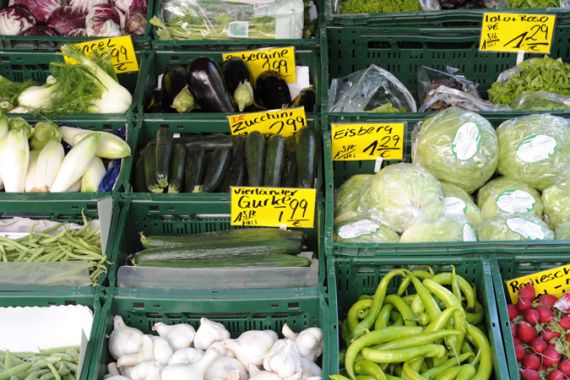Beansprouts ‘likely cause’ of E.coli outbreak
Test results prompt German state of Lower Saxony to ask people to stop eating the locally grown produce.

German agricultural authorities identified locally grown beansprouts as the likely cause of an E. coli outbreak that has killed 22 people and sickened hundreds in Europe.
The Lower Saxony agriculture ministry was sending an alert on Sunday warning people to stop eating the sprouts, which are often used in mixed salads, Gert Hahne, a ministry spokesman, said.
Keep reading
list of 4 itemsRainfall set to help crews battling wildfire near Canada’s Fort McMurray
The Alabama town living and dying in the shadow of chemical plants
How India is racing against time to save the endangered red panda
“Bean sprouts have been identified as the product that likely caused the outbreak,” Hahne said, adding that “many restaurants that suffered from an E.coli outbreak had those sprouts delivered.”
Hahne said the sprouts were grown on a farm in Lower Saxony in northern Germany. He did not elaborate but planned a news conference later on Sunday.
Hahne said while official test results have not yet conclusively shown that the Lower Saxony-grown sprouts were to blame, “all indications speak to them being” the cause.
He also said authorities would still keep their warning against eating tomatoes, cucumbers or lettuce in place for now.
Deadliest E.coli outbreak
The crisis is the deadliest E. coli outbreak in modern history. The head of Germany’s national disease control center raised the death toll to 22 Sunday – 21 people in Germany and one in Sweden – and said another 2,153 people in Germany have been sickened.
That figure includes 627 people who have developed a rare, serious complication that can cause kidney failure.
The World Health Organization said 10 other European nations and the US have reported a total of 90 other victims.
Earlier in the day, Germany’s health minister fiercely defended his country’s handling of a deadly E. coli outbreak as he toured a hospital in Hamburg, the epicenter of the crisis.
The comments by Health Minister Daniel Bahr seemed to reflect a sharp U-turn in his public response to the crisis and came after the Associated Press news agency reported on the chaos and unsanitary conditions in the emergency room of the same hospital, the University Medical Center in Hamburg-Eppendorf.
Prior to his visit, Bahr admitted that hospitals in northern Germany were struggling to provide enough beds and medical care for patients stricken by the bacterial outbreak, and suggested that other regions start taking in sick patients from the north.
But after one E. coli survivor said that sanitary conditions at the Hamburg hospital were horrendous when she arrived with cramps and bloody diarrhea, Bahr announced his visit and changed his tune.
Bahr told reporters that, despite capacity problems at some hospitals, German medical workers and northern state governments were doing “everything necessary” to help E. coli victims.
“I witnessed how the employees in the institutions have been working intensively and informing patients early and transparently” about their conditions, Bahr said.
Bahr said he wanted to see the situation firsthand and talk to physicians and nurses who have been working overtime and double-shifts for weeks in a row.